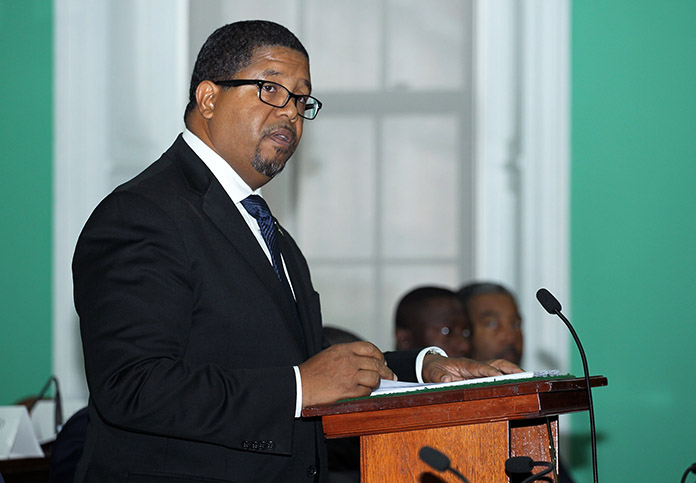
Mr. Speaker, A new day has dawned over our beloved Bahamaland. Our fellow citizens have voted decisively and overwhelmingly for a desperately needed and progressive change in direction. Understandably, Bahamians yearn for a better future for themselves and their children. They want a Government that works for their benefit rather than its own. They want real progress rather than false optimism and broken promises.
Accordingly, they rightfully expect from their Government: strong and decisive leadership transparency and accountability prudent management of their tax dollars a growing economy that supports new job growth rising rather than stagnant wages Bahamian ownership opportunities less burdensome taxes a business and regulatory environment that promotes entrepreneurship more effective education and training systems and youth empowerment…
Click to download the attached file(s):
Budget_Communication_-_May_31__2017.pdf
Recurrent Expenditure for the Fiscal Year 2017/18 to Increase by $218 Million
NASSAU, The Bahamas — Deputy Prime Minister and Minister of Finance the Hon. K. Peter Turnquest said Recurrent Expenditure for the fiscal year 2017/18 is posted at a level of $2,676 million, which represents an increase of $218 million over the $2,458 million outturn for 2016/17.
“A significantly higher level of Debt Redemption of $125 million, from $308 million to $433 million, accounts for the lion’s share of the spending increase and is primarily explained by refinancing activities,” DPM Turnquest said as he presented the Budget Communication 2017/2018 in the House of Assembly, Wednesday, May 31, 2017.
He said of the remaining rise in Recurrent Expenditure, of $93 million, the following increases are noteworthy:
· $40 million to the Ministry of Health for the NHI Authority;
· within the Ministry of Public Service and National Insurance, $35 million for medical insurance premiums; $16 million for pensions; $6 million for gratuities; and $10.6 million for office rent;
· for the Royal Bahamas Police Force, $5.6 million to cover the balance of overtime payments; and
· overall the budget includes a $27 million increase for persons engaged during the 2016/2017 fiscal year, $8 million for increments and $7.5 million to accommodate payments as per industrial agreements with various public sector unions.
DPM Turnquest said, “As these other increases total some $155 million, it may be seen that, in reality, we have held the line on expenditure and are accommodating only the highest priority obligations.
“Capital Expenditure in 2017/18 is projected at $230 million, down from the hurricane-impacted level of $310 million in 2016/17, to represent 2.5 per cent of Gross Domestic Product (GDP), which is fully in line with historical trends.”
He explained that for its part, Recurrent Revenue for 2017/18 is projected to return, post-hurricane, to the trend ratio to GDP that had been targeted through the previous Administration’s programme of revenue reform, including Value Added Tax implementation.
The DPM said accordingly, with the somewhat more buoyant growth in the economy that is projected for both 2017 and 2018, and including the fiscal impact of the revenue measures in this Budget, Recurrent Revenue is forecast at $2,150 million in the coming fiscal year, up $190 million from the previous, depressed year.
“On the basis of these projected fiscal developments, the Government Finance Statistics (GFS) Deficit in 2017/18 is targeted at $323 million, or 3.5 per cent of GDP.”
He noted that while that is a marked improvement from the estimated $500 million deficit recorded this year, it is still higher than the $310 million deficit posted in 2015/16.
With an ongoing Deficit of the magnitude projected for the upcoming year, the level of the Government Direct Charge is forecast to reach $6.8 billion at the end of 2017/18, or a new all-time high of 72.7 per cent of GDP Fiscal Policy beyond 2017/18.
DPM Turnquest also explained that in the multi-year scenario, Recurrent Expenditure is projected lower by some $200 million, in each of 2018/19 and 2019/20, to levels in the area of $2,450 million.
He said this is largely due to significantly lower Debt Redemption payments each year. Capital Expenditure is projected to remain around 2.3 per cent to 2.4 per cent of GDP in the outer years, with annual levels on the order of $230 million, essentially unchanged from 2017/18.
The DPM also said for its part, Recurrent Revenue is assumed to remain at 23 per cent of GDP going forward, implying levels on the order of $2.2 billion and $2.3 billion in 2018/19 and 2019/20, respectively.
“As a result, the GFS Deficit may be expected to decline steadily to levels of $228 million in 2018/19 and $106 58 million in 2019/20. That would represent 2.3 per and 1.1 per cent of GDP, respectively.
He explained that with these developments, the level of Government Debt would still continue to rise, reaching $7.1 billion at the end of the projection horizon.
“However, with the smaller annual Deficits that are projected, the ratio of Government Debt to GDP would begin to decline in 2018/19, from the peak of 72.7 per cent in 2017/18, and would reach 70.8 per cent of GDP in 2019/20,” DPM Turnquest said.







